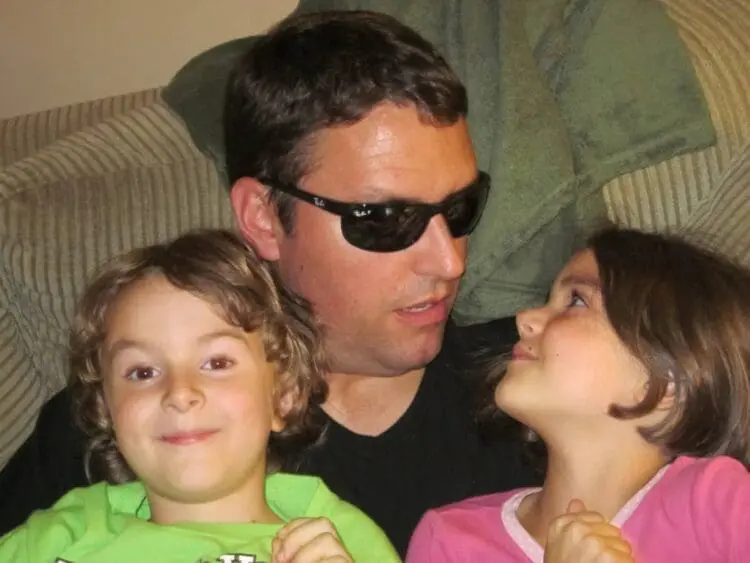All of my work centers around communication – whether it be coaching clients, consulting businesses or teaching parents. I firmly believe that great communication skills can make the world better and change your life, both personally and professionally. With that said, I think there are two main areas where parents can use a little help when it comes to dealing with their children. The two basics – talking and listening to children. We often need to be aware of the way we are talking and also learn how to do less talking and more listening. Learning to really listen can make a huge difference to building a strong relationship with your kids.

Tips For How To Talk To Kids
Conversations are a huge part of any parent and child relationship but not all communication is good and/or productive. Us parents often make our kids crazy trying to talk to them – and the craziness runs both ways when they try to get a point across to us! Under the stress of parenting, a lot of us hit that point where our communication efforts become emotional. It’s normal and it is easy to do. We get into a (bad) habit of yelling at our child, standing over them and poking a finger at the poor kid. Simply said – stop doing that!
Your intimidating style may have the goal of impressing your kid with power and authority, but all it really shows is that you have lost control – of yourself, the situation, and probably your child as well. Plus, it’s rude and demeaning to your kid. When they get this attitude from you, your child won’t exactly feel like you’re open to their input. So they stay silent and often get pouty, and this leads to you getting even more upset. Which in turn often leads to the you demanding an answer or asking if the child is even listening. The whole scene is a bad example for handling emotions and dealing with problems and qualifies as horrible communication! Emotions are normal and natural and everyone experiences them, including anger and frustration. The next time you are in a tough spot, try a couple of these tips.
Take a deep breath, chill out, relax, walk away, and count to 10. Get out of the emotional space and back to a rational place! Try sitting down. This will put you at eye level with your child, so you’re not towering over them in a threatening way. Reach out and hold your kid’s hand. This simple gesture creates a bond and also keeps you from poking your angry finger in their face. Finally, give it a rest. Take a break if you or your child gets too worked up and revisit the conversation in an hour or so.

Tips For Actively Listening To Children
Active listening is a communication technique that involves fully concentrating, understanding, responding, and remembering what is being said. It’s a way of listening and responding to another person that improves mutual understanding. It involves paying close attention to the speaker, asking clarifying questions, and reflecting back what you’ve heard to ensure understanding. Active listening can help improve relationships, resolve conflicts, and build trust.
Today’s kids live in a high-pressure, 24/7 world. Technology, the internet, and a mass connected sea of humanity make everything larger, more accessible, and more instantaneous. Kids have problems that their parents often won’t be able to understand. The old advice that starts with, “When I was a kid…” Simply no longer makes any sense. Yes, yes – my dad also walked through six feet of snow for 87 miles just to get a gallon of milk! I get it but while we are older and have more experience with life, when it comes to figuring out 2016, your child is often just as knowledgeable as you. whether you want to admit it or not! Even so, it’s hard to resist the temptation to tell your kid how to handle the situation and then expect them to do it your way.
Listening to children is a much more effective approach to helping your child work through problems and make decisions. Listening (and great communicating) are hugely important life skills that need help and guidance to develop. Instead of telling your kid what to do in a situation, ask them to tell you what they think is a good choice and what they want ultimate outcome to be (this works wonders with my son). Pay attention to their feelings. Actively listen and learn about their daily life and achievements. Ask them what they are thinking and what emotions they have. This working together helps your child explore possibilities, it creates a great bond and intimacy, and it gives you a deeper understanding of how they think and operate. Ultimately, ask what they plan to do, develop that plan, and ask how they are going to put it into action.
Your job throughout this process is to listen, to guide them, to offer encouragement, and to occasionally ask questions to get more info. When think you can offer a valuable point, ask your child if they want to hear it. If the answer is yes, tell them your thoughts and feelings. If the answer is no, accept it (put your ego aside) and move on. Sometimes parents just have to hold our breath, hope for the best, and let our kid learn from experience.
Conclusion
Communicating with children requires a thoughtful approach that considers their developmental stage, emotional maturity, and individual personality. Children may take longer to process information and respond. Give them the time they need to express themselves. Create a safe and supportive environment where children feel comfortable expressing their thoughts and feelings. Pay attention to what the child is saying and respond appropriately. Show that you are interested in their thoughts and feelings. Try to understand the child’s perspective and validate their feelings, even if you don’t agree with them. Clearly communicate your expectations and rules, and explain the reasons behind them.
Raising children is a tough stuff, we all know this. As they mature, their needs, expectations, and communication style will evolve and change. It’s hard to predict what will happen next and you don’t have to have every answer. Recognizing when you need to make an adjustment in your communication skills and style goes a long way toward being the parent your child needs (and wants) – and trust me, your kid will forgive your occasional mistake! Maintain consistency in your communication and responses to help children feel secure and understand boundaries. Acknowledge and praise the child’s efforts and achievements to build their confidence and self-esteem. What are your best tips for talking and listening to children?

Rob Youngblood is a Single Dad, Keynote Speaker, Emmy Award Winning TV Host, Communication Expert, Life and Reality Coach. You can follow him on Twitter.

Amity Hook-Sopko says
What a refreshing article! I feel like so many parents are just talking AT their kids without really listening to what they have to say. It makes all the difference.
Mikki says
Children want to be heard also. They need need a voice and they need help building confidence not just a saying of because I said so I hate that reply just lazy parenting.